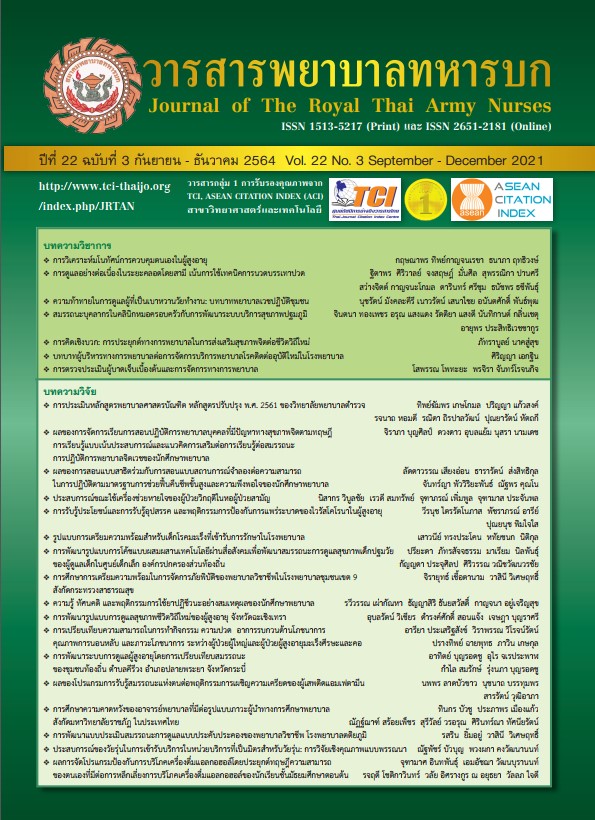Development of Program for Promoting Executive Functions of the Brain by Neuro-Linguistic Programming for Secondary School Students With Internet Addiction
Keywords:
Executive functions, Neuro-Linguistic Programming, Secondary school students with internet addictionAbstract
This research is experimental research that aimed to develop and to test the effectiveness of the enhancement of executive functions of the brain by neuro-linguistic program (NLPEFs) for secondary school students with internet addiction. The subjects were 60 secondary school students with internet addiction. They had a score of internet addiction at ≥ 51 points. They were randomly assigned into two groups: an experimental and a control group which consisted of 30 persons in each group by matching the executive functions score from Wisconsin card sorting (WCST-64). The research instruments were; 1) The WCST-64 2) Behavior Rating Inventory of Executive Function-Self-Report (BRIEF-SR) Thai-version and 3) The NLPEFs were developed by the researcher. The experiment lasted for 6 sessions, each session lasted for 50 minutes, for a total of two weeks. The assessments were done in 3 phases: pretest, posttest, and follow-up phases. The data was analyzed by a repeated-measures analysis of variance and paired-different test by Bonferroni method.
The results revealed that; 1) The experimental group had the mean score of EFs higher than those in the control group in the posttest and follow-up with statistically significant at .05 level. 2) The experimental group had the mean score of EFs in the posttest and follow-up higher than the pretest with statistically significant at .05 level. It was concluded that the EFs enhancement program with NLP affected enhancing EFs among secondary school students with internet addiction.
Downloads
References
Wonganantnont, P. Excessive Internet Usage Behavioral in Adolescents. Journal of The Royal Thai Army Nurses. 2014; 15(2): 173-178. (in Thai)
Chutabhakdikul, N. Digital generation. Encylopedia of education. 2015; 50: 79-83. (in Thai)
Uraiwan, P., Leeyutthanont, M. & Kaewsakulthong, J. The relationships between Personal factors Internet Utilization and Depression of Nursing Students of Boromarajonani College of Nursing, Suratthani. Journal of Health Research and Innovation 2019; 2(1): 12-24. (in Thai)
Heanjohn, J., Sirithadakunlaphat, S., & Supwirapakorn, W. Development of trainging program on promoting executive function of the brain in adolescents. Journal of The Royal Thai Army Nurses. 2018; 19(2):220-30. (in Thai)
Haenjohn, J. Cognitive psychology (2sd ed). Bangkok, Grandpoint, 2019. (In Thai)
Alizadehgoradel, J., Imania, S., Nejati, V., & Fathabadi, J. Mindfulness-based substance abuse treatment (MBSAT) improves executive functions in adolescents with substance use disorders. Neurology, Psychiatry and Brain Research. 2019, 34: 13-21.
HemmatiMaslakpak, M., Farhadi, M. & Fereidoni, J. The effect of neuro-linguistic programming on occupational stress in critical care nurses. Iranian journal of nursing and midwifery research. 2016; 21(1): 38-44.
Campillo, E., Ricarte, J. J., Ros, L., Nieto, M., & Latorre, J. M. Effects of the visual and auditory components of a brief mindfulness intervention on mood state and on visual and auditory attention and memory task performance. Current psychology. 2018; 37(1), 357-365.
Suyajai, P. The Effect of Buddhist Group Counseling on Developing Reasoned Attention and Self-Regulation of Students By Neuro Linguistic Programming (NLP) in the Psychotherapy. Mahachula Academic Journal. 2019; 6(1): 95-111. (in Thai)
Florina, G. E., Teodor, G. V., Cornelia, P. S., & Marin, D. Neuro-linguistic Programming and the Relationship between Attention and Anxiety in Alpine Skiing Juniors. Social and behavioral sciences. 2015; 191: 1634-1638.
Haenjohn, J. Neuro-linguistic programming [NLP]: application for counseling, learning, and Business: Chonburi, Get Good Creation; 2014. (in Thai)
Young, K. S. Internet Addiction Test (IAT). Wood Dale, IL: Stoelting. 2017.
Kongs, S. K., Thompson, L. L., Iverson, G. L., and Heaton, R. K. Wisconsin Card Sorting Test®-64 Card Version: Professional Manual. Odessa, FL. Psychological Assessment Resource. 2000.
Guy S. C., Isquith P. K. & Gioia, G. A. Behavior rating inventory of executive function. Odessa, FL: Psychological Assessment Resources; 2004.
Howell, D.C. Statistical Methods for Psychology (6th ed). Australia: Thomson/Wadsworth, 2007.
Sailuenam P. The effects of neuro linguistic programming on anxiety of freshmen undergraduste students faculty of education. M.Sc. Chonburi: Burapha University; 2016. (in Thai)
Jarusaksri, T. The development of self-mastery through neuro linguistic programming group counseling. M.Sc. Chonburi: Burapha University; 2016. (in Thai)
Mrazek, M. D., Franklin, M. S., Phillips, D. T., Baird, B. & Schooler, J. W. Mindfulness training improves working memory capacity and GRE performance while reducing mind wandering. Psychological Science. 2013; 24(5): 776-781
Fahimi Rad, S. Z. & Salehi, G.H. (2018). Effectiveness of Strategic Training of Neuro-Linguistic Programming on Improving the Quality of Life of Veterans’ Spouses with Injury Rate of 25 to 50 Percent; A Case Study of Tehran Province. Iranian journal of war & public health. 2018; 10(4): 181-186.
Panyencheun, W., Haenjohn, J. & Sirithadakunlaphat, S. Development of program to promote attention based on Neuro-Linguistic Programming in primary school students. Journal of The Royal Thai Army Nurses. 2019; 20(3): 305-312. (in Thai)
Sailuenam, P., Inung, P. & Hanjone, J. The effects of neuro linguistic programming on anxiety of freshmen students. Journal of the police nurses. 2019; 11(1): 206-215.
Sutho, T. The Effects of future planner based on neuro linguistic programming upon the decision making to extened study of secondary education grade 3 students at Buayai school in Nakhon Ratchasima province. Faculty of education M.Sc. Nakhon Ratchasima: Nakhon Ratchasima Rajabhat University; 2010. (in Thai)
Downloads
Published
How to Cite
Issue
Section
License
บทความหรือข้อคิดเห็นใดใดที่ปรากฏในวารสารพยาบาลทหารบกเป็นวรรณกรรมของผู้เขียน ซึ่งบรรณาธิการหรือสมาคมพยาบาลทหารบก ไม่จำเป็นต้องเห็นด้วย
บทความที่ได้รับการตีพิมพ์เป็นลิขสิทธิ์ของวารสารพยาบาลทหารบก
The ideas and opinions expressed in the Journal of The Royal Thai Army Nurses are those of the authors and not necessarily those
of the editor or Royal Thai Army Nurses Association.






